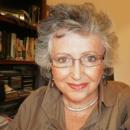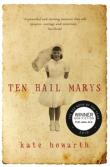AustLit
-
In the fifteenth of this series of interviews, Anita speaks to Kate Howarth.
Kate Howarth is the award-winning author of Ten Hail Marys: A Memoir, in which she vividly recounts her early years growing up in Sydney’s inner city, western suburbs and far western New South Wales. Kate identifies with the Wonnarua people of the Hunter Valley, through her Granny, ‘Lizzy’ Harriet Higgins (nee Wood) and the Wiradjuri people of western New South Wales. Her family, originally from Nyngan, Bourke and Cobar areas, migrated to the inner city of Sydney during the Second World War.
-
My early years were spent in the inner city suburb of Darlington, when my family had to leave the bush in search of work during the Second World War. I went to school at Parramatta and lived a stone’s throw from the lake, where I was a founding member of the Lake Parramatta Life Saving Club. I spent time in the outback, near Brewarrina, on a sheep station where my grandmother worked, where I learned to ride, shoot, and more importantly, outrun the wild pig that was charging me and get back on my horse.
-
Books didn’t feature large in my early life. Firstly, we didn’t have the money to buy books. Storytelling and listening to the radio was what sparked my imagination before I started school. My Aunt Daphne, whom I spent a lot of time with, used to buy me Little Golden Books. Uncle Jack, her husband, used to read to me every Sunday morning and my favourite stories were from Mark Twain’s Adventures of Tom Sawyer. The first book I ever purchased was a Collins Pocket Dictionary, when I was eight years old. When teachers read from Enid Blyton or May Gibbs I was transported into the bush, helping the Ragged Blossom hide from the Banksia men. This was when I realised the magic, and escapism, that came with a good story.
-
What book has had an impact on your life and why?
So many books have impacted on my life it’s hard to single one out for special mention. For most of my life reading was something I did not so much for pleasure and entertainment, but to make up for an education cut short.
When I discovered that everything I needed to learn, in a practical sense, could be obtained at the library I became a glutton for knowledge. At any one time I’d have books on etiquette, dressmaking, cooking, accounting and business management all on the go at once. This tendency toward eclectic reading continues today. But these days I do have the luxury to toss in reading for pure pleasure and entertainment.
One of the funniest books I ever read was Spike Milligan’s Adolf Hitler: My Part in his Downfall. In 1972 I read Dee Brown’s Bury My Heart at Wounded Knee and hoped that someday, someone would write a book that told the true story of the settlement of this country. Kevin Gilbert's book, Because A White Man'll Never Do It, has a pretty good stab at it.
-
Richard Bode’s First You Have to Row a Little Boat. A treasure full of profound insight as he applies the lessons of learning to sail, with those we need to follow to keep ourselves afloat.
-
-
As with most of the skills I have acquired in this life I am completely self-taught. In addition to writing I like to sing and paint. We learn both of those skills by observing how others do it. Then, with practice, we find our own particular style.
-
I don’t see writers as either good or bad. Some writers have a superior skill to engage me and others don’t, but that doesn’t mean the latter are not good writers. It’s an art form and the beauty is in the eye of the beholder.
-
As I have not completed a work in another genre to date I can’t answer that. But if you ask again after I have completed my current work in progress, I shall let you know how difficult it was. So far I am experiencing many differences in writing fiction, than those I had whilst writing non-fiction.
-
That came from Alex Miller, twice Miles Franklin winner, among a raft of literary awards at home and abroad, when he said ‘write for the prize'.
You might be interested in...






